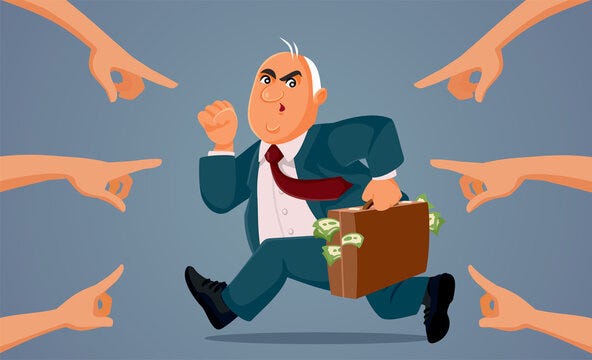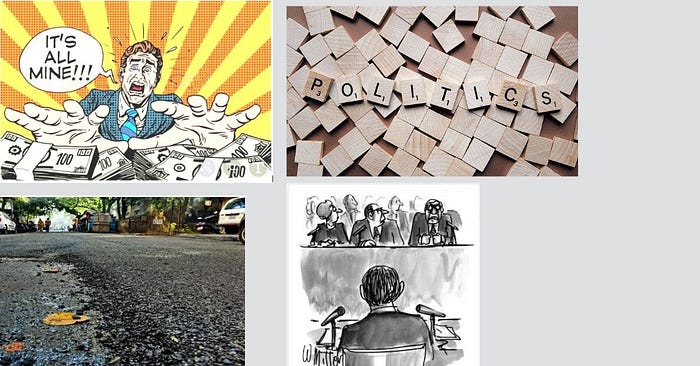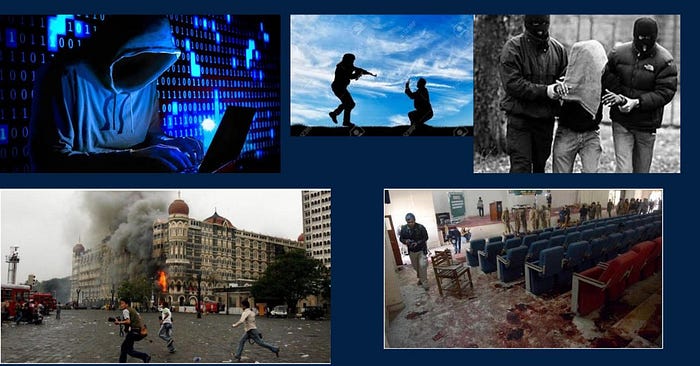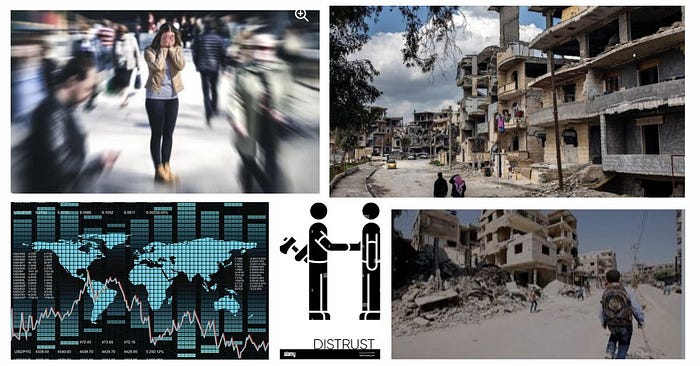A Corrupt Politician and a Terrorist

Introduction
In today's world, corruption and terrorism are two of the most pressing issues that governments and societies face. Both have devastating effects on individuals, communities, and nations as a whole. In this blog post, we will explore the topic of a corrupt politician and a terrorist, two individuals who may seem very different but share some similarities.
A. Explanation of the Topic
A corrupt politician is someone who uses their position of power for personal gain, often at the expense of the public. This can include accepting bribes, embezzling funds, or misusing government resources. On the other hand, a terrorist is someone who uses violence or intimidation to achieve political goals. They often target innocent civilians, causing fear and disruption in society.
B. Importance of the Topic
The topic of a corrupt politician and a terrorist is important because it affects us all. Corruption undermines the trust and integrity of government institutions, leading to an erosion of democracy and justice. Terrorism, on the other hand, poses a threat to the safety and security of individuals and communities. Understanding the causes and consequences of both corruption and terrorism is crucial for finding effective solutions to these issues. By raising awareness and promoting discussion, we can work towards a better, safer future for all.
The Corrupt Politician

A. Definition of Corruption
Corruption is the abuse of power for personal gain. It can take many forms, such as accepting bribes, embezzling public funds, or using government resources for personal purposes. Corruption undermines the trust and integrity of government institutions, leading to an erosion of democracy and justice.

B. Examples of Corrupt Politicians
Corruption is a global problem, and unfortunately, it is not limited to any particular country or region. Some of the most notorious cases of corrupt politicians include:
· Ferdinand Marcos, former President of the Philippines, who embezzled an estimated $5 billion during his regime.
· Slobodan Milosevic, former President of Yugoslavia, who was involved in embezzlement, arms trafficking, and war crimes.
· Silvio Berlusconi, former Prime Minister of Italy, who was convicted of tax fraud and bribery.

C. Effects of Corruption on Society
The effects of corruption on society are far-reaching and devastating. Corruption undermines the rule of law, distorts the economy, and perpetuates poverty. It also erodes public trust in government institutions, leading to a decline in civic engagement and a rise in social unrest. Corruption often leads to a vicious cycle, in which corrupt officials remain in power, perpetuating their own corruption and further exacerbating societal problems.

D. Possible Reasons for Political Corruption
There are many reasons why politicians may engage in corrupt practices. Some possible reasons include:
· Greed: Some politicians may be motivated by personal gain, seeking to enrich themselves at the expense of the public.
· Lack of transparency: A lack of transparency and accountability in government institutions can create an environment in which corruption can thrive.
· Political culture: In some cases, corrupt practices may be normalized within a political culture, making it difficult to break the cycle of corruption.
· Poor enforcement: Weak law enforcement mechanisms and ineffective punishment for corruption can embolden corrupt politicians.
In conclusion, corruption is a serious problem that affects all of us. By understanding the causes and effects of corruption, we can work towards finding effective solutions to this complex issue.

The Terrorist

A. Definition of Terrorism
Terrorism is the use of violence and intimidation in the pursuit of political goals. It often involves targeting innocent civilians and causing fear and disruption in society. The motives of terrorists can vary, but their tactics are designed to create chaos and undermine the stability of society.
B. Examples of Terrorist Activities
Terrorism has taken many forms throughout history, from anarchist bombings in the 19th century to the attacks on September 11, 2001. Some
examples of terrorist activities include:
· Suicide bombings in the Middle East and South Asia
· Mass shootings in the United States and Europe
· Hijackings and kidnappings in various parts of the world
· Cyber attacks and other forms of digital terrorism

C. Effects of Terrorism on Society
The effects of terrorism on society are profound and far-reaching. Terrorism creates fear and anxiety among the public, leading to a sense of insecurity and mistrust. It also disrupts daily life, causing economic and social losses. In addition, terrorism can exacerbate social and political tensions, leading to further violence and instability.

D. Possible Reasons for Terrorism
Terrorism is a complex phenomenon, and its causes are often difficult to pinpoint. Some possible reasons for terrorism include:
· Ideology: Some terrorists are motivated by political or religious ideology, seeking to promote a particular worldview or agenda.
· Revenge: In some cases, terrorism may be used as a means of retaliation for perceived injustices or grievances.
· Alienation: Terrorists may feel alienated or marginalized from mainstream society, leading them to seek a sense of identity and purpose through violent means.
· Poverty and inequality: Economic and social disparities can create a breeding ground for terrorism, as individuals may feel desperate and disillusioned with their situation.
In conclusion, terrorism is a serious threat to the safety and security of individuals and communities around the world. By understanding the causes and effects of terrorism, we can work towards finding effective solutions to this complex issue. It is important to remain vigilant and proactive in the face of this ongoing challenge.

Similarities and Differences
A. Comparison of Corrupt Politicians and Terrorists
Corrupt politicians and terrorists are two groups that can have a significant impact on society, but in very different ways. While corrupt politicians seek to use their power for personal gain, terrorists use violence and fear to achieve their goals. Despite their differences, there are some interesting comparisons that can be made between the two.
B. Similarities Between the Two
One of the main similarities between corrupt politicians and terrorists is their willingness to engage in immoral or illegal behavior to achieve their goals. Both groups are motivated by a desire for power and control, and they are often willing to harm innocent people in the process. In addition, corrupt politicians and terrorists can both be seen as threats to the stability and security of society as a whole.
C. Differences Between the Two
Despite these similarities, there are also some key differences between corrupt politicians and terrorists. One of the main differences is their methods. Corrupt politicians use their positions of power to engage in illegal or unethical behavior, whereas terrorists use violence and fear to achieve their goals. In addition, corrupt politicians tend to be more concerned with personal gain, while terrorists are often motivated by ideological or political goals.
Another key difference between the two is their impact on society. Corrupt politicians can undermine the trust and integrity of government institutions, leading to a decline in democracy and justice. However, their impact is usually more localized, affecting a particular region or country. On the other hand, terrorism can have a global impact, creating fear and anxiety on a large scale and disrupting daily life in multiple countries.
In conclusion, corrupt politicians and terrorists are two groups that can have a significant impact on society, but in very different ways. By understanding the similarities and differences between the two, we can gain a better understanding of the complex issues facing the world today. While corruption and terrorism are both significant challenges, it is important to address them separately and with different strategies in order to effectively combat these issues.
Consequences
A. Possible Consequences for Corrupt Politicians
Corrupt politicians can face a range of consequences for their actions, depending on the severity of their offenses and the laws in their country. Some possible consequences for corrupt politicians include:
· Impeachment or removal from office
· Criminal charges and imprisonment
· Fines or financial penalties
· Loss of reputation and public trust
· Social isolation and ostracism
The consequences of political corruption can also be felt more broadly in society. Corruption can lead to a lack of public trust in government institutions, undermine democracy, and contribute to economic inequality and social injustice.
B. Possible Consequences for Terrorists
Terrorists who engage in violent activities can also face severe consequences for their actions. Depending on the country and the severity of their offenses, possible consequences for terrorists can include:
· Imprisonment or execution
· Military action, such as drone strikes or special operations
· Diplomatic sanctions and economic isolation
· Increased surveillance and monitoring
· Loss of support and legitimacy among their followers
The consequences of terrorism can also be far-reaching and long-lasting. In addition to the immediate impact on the victims of terrorist attacks, terrorism can create fear and anxiety in society, disrupt daily life, and lead to social and political tensions.
C. Effects on Society
The effects of political corruption and terrorism on society are significant and far-reaching. Both can lead to a loss of public trust in government institutions, undermine democracy, and create social and economic inequalities. Terrorism can also create fear and anxiety in society, disrupting daily life and leading to social and political tensions.
In addition, the consequences of corruption and terrorism can have a domino effect, leading to further issues and challenges in society. For example, political corruption can lead to a lack of investment in education and healthcare, exacerbating social inequality and poverty. Similarly, terrorism can lead to an increase in authoritarianism and a decline in civil liberties, further eroding democracy and freedom.
In conclusion, the consequences of political corruption and terrorism can have significant and long-lasting impacts on society. By understanding the potential consequences of these issues, we can work towards finding effective solutions and strategies to address them. It is important to remain vigilant and proactive in combating corruption and terrorism, in order to create a more just and secure society for all.
Conclusion
A. Recap of the Main Points
In this article, we have explored the complex issues surrounding corrupt politicians and terrorists, examining their definitions, examples, effects on society, and possible reasons for their actions. We have also looked at the similarities and differences between the two groups, as well as the possible consequences for their actions.
Throughout this article, we have explored several key points, including:
· Corruption is the abuse of power for personal gain, while terrorism is the use of violence and fear to achieve political or ideological goals.
· Both corrupt politicians and terrorists can have significant impacts on society, but in very different ways.
· Corrupt politicians and terrorists are often motivated by a desire for power and control, but the methods they use to achieve their goals are very different.
· The consequences of political corruption and terrorism can be severe, and can have a lasting impact on society as a whole.
B. Final Thoughts
The issues of political corruption and terrorism are complex and challenging, and require a multi-faceted approach to address. It is important to remain vigilant and proactive in combating these issues, and to work towards creating a more just and secure society for all.
At the same time, it is important to recognize the root causes of these issues, and to work towards addressing them through education, economic development, and social and political reforms. By addressing the underlying causes of corruption and terrorism, we can create a more just and equitable society, and reduce the likelihood of these issues occurring in the first place.
C. Call to Action
As individuals, we can play a role in addressing the issues of political corruption and terrorism by staying informed, speaking out against injustice, and advocating for reforms and policies that promote transparency, accountability, and democracy.
We can also support organizations and initiatives that work towards these goals, whether through volunteering, donating, or raising awareness.

Together, we can work towards a more just and secure society, where corruption and terrorism have no place, and where all individuals are able to live their lives free from fear and oppression.